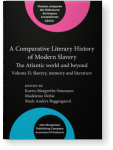Chapter 18
Self-expression by black Antillean women
Disempowering self-censorship and remembering history
This chapter presents a reflexive analysis of two oeuvres: Mes Quatre Femmes
by Gisèle Pineau and Mes Météores, Combats Politiques au Long Cours by Christiane
Taubira. The analysis comes from the findings of my previous research in social sciences. The data revealed the
extreme sensitivity of black Antillean women in expressing their thoughts and ideas freely. Their positions in an
entre-deux (sitting on the fence) signal a form of hesitance and self-censorship. This chapter examines how Pineau
and Taubira substantiate the silenced voices of the data that emerges from my quantitative research. The
narratives and life experiences of these authors reveal how written words and self-expression are an act of
resistance to the phenomenon of self-censorship.
Article outline
- Introduction: Literary hermeneutic of research in social sciences
- Self-expression and self-censorship
- Self-expression: A testimony of self-dissidence
- Historical legacy and decolonial her-stories
- Using her-stories to frame collective memory
- Using self-expression to amend duty of memory
- Conclusion: Opening the self to a form of liberatory ‘femihumanism’
- Author queries
-
Notes
-
References
This content is being prepared for publication; it may be subject to changes.
